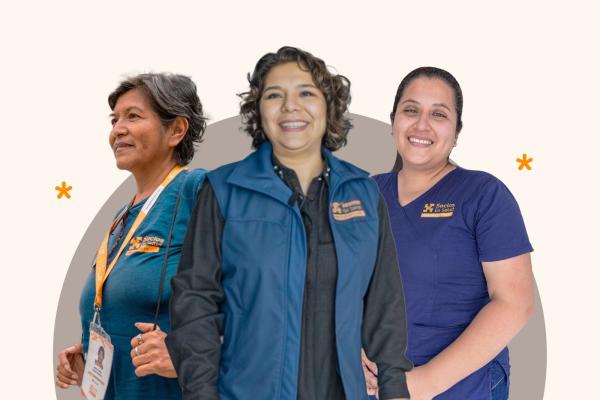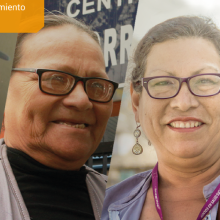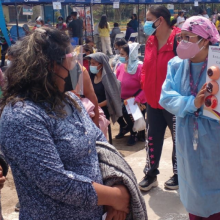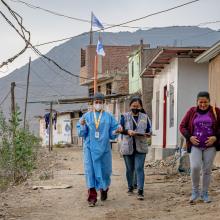As every year, this March 8th marks the International Women’s Day. A date that, far from being celebrated, should call for reflections around the gender inequality still in force in different areas, which limits women’s participation in society.
But this anniversary also makes visible the victories achieved in the struggle for equal rights. Although the salary gap in the health sector is a latent problem, it is worth highlighting the increase in female representation in the health personnel.
A report prepared by the World Health Organization (WHO) and the International Labor Organization (ILO), in 2022, reports that globally women represent 67% of professionals dedicated to health care.
This trend is also evident in Latin America and the Caribbean, according to a study by the Inter-American Development Bank (IDB), published in 2019, which records the following result: 57% of physicians in the region are women.
At Socios En Salud (SES) we are no strangers to this reality. There are many women professionals in our team who collaborate every day with an enormous commitment to make our mission possible: to bring the benefits of modern science to the most vulnerable communities.
Therefore, we want to commemorate 8-M (as this date is known) with three stories that are inspiring for the transformative power that these women have undertaken in their respective fields in favor of the cure against social injustice.
The WHO and the ILO report that women represent 67% of professionals dedicated to health care. The IDB, for its part, points out that 57% of physicians in Latin America and the Caribbean are women.
Milagros Nuñovero and the art of keeping SES in order
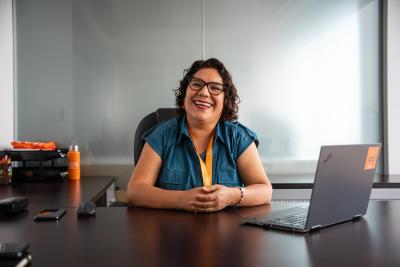
La directora de Finanzas y Administración, Milagros Nuñovero, lleva 19 años en Socios En Salud, donde desempeña un rol clave para nuestra organización.
When Milagros Nuñovero, director of Finance and Administration at SES, finished high school, her first career choice was dentistry. That branch of medicine seemed stimulating to her, but today she believes she would not have been able to dedicate herself to extracting molars, for example. “I’m a little bit afraid of blood,” she confesses.
Despite that alternative, she decided to study accounting at the National University of Callao (UNAC). The reason? “I have always had an affinity for control and order. I think my father had an influence, because he is someone who is quite methodological and orderly,” she says. That’s how, in the first years of general studies, she fell in love with her profession.
Bottom line, however, Milagros did not abandon that initial calling to care for anyone in need. She was able to prove it in the summer of 2005, when she joined SES as a sub accountant. “Here you feel part of a contribution, that’s something that pulled me and was the reason I stayed at SES: you really feel like we’re changing realities, saving lives,” she says.
Nearly two decades have passed since then. Today, our Director of Finance and Administration looks back to notice the changes in the organization: “I think we women contribute with a different look, not only because of our gender, but because of our profession. That makes us have a stronger board and make better decisions.”
Their decisions influence a decisive area for our organization: managing revenues efficiently. Hence, to date, he is focused on consolidating the units he is in charge of, such as internal audit. “We work with donation money, we have a high responsibility to be effective and honest,” he says. Her work proves it.
Jimena Ruiz, a leading research doctor
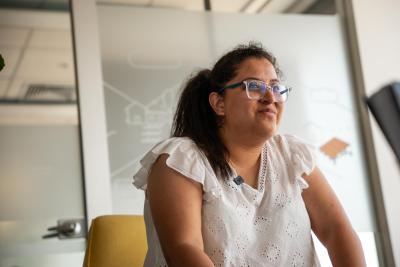
La doctora Jimena Ruiz, coordinadora del Programa VIH, ha participado en múltiples investigaciones de valor en Socios En Salud. Una de ellas es el ensayo clínico del endTB, que dio como fruto el tratamiento reducido para pacientes con tuberculosis.
Since she was four years old, Jimena Ruiz had it clear: she wanted to be a doctor. “In initial, I would tell my teacher not to worry if she felt sick, because I was going to take care of her,” she says. At her school, she never missed an opportunity to lead care groups, and so it was only natural that she chose to study medicine when she entered the Peruvian University of Applied Sciences (UPC).
Throughout her career, our SES HIV Program Coordinator has not followed a conventional path. After a year in Piura, where she did her Rural and Urban Marginal Health Service (Serums), she knew she wanted to serve a community rather than just specialize. A friend of his told him about an organization that fit this quest.
“It was my first time rotating to Collique Hospital. There they were doing the EndTB 2 clinical trial, from Partners In Health,” he recounts. Being part of this research - which has reduced the treatment for multidrug-resistant tuberculosis (MDR-TB) patients to a duration of nine months without injections - is a milestone in her career.
What fascinates her most, precisely, is the privilege of witnessing people’s recovery. “The advantage of SES is that the follow-up is long, then you really see the impact. You see how everything you’ve studied and the new things that are coming up really make a difference,” he says.
This experience, moreover, has taught her that scientific research is a challenging alternative, which can also be so for many women who now fill medical schools. “They can participate in studies as early as undergraduate and then get involved in clinical trials. They don’t just have this one specialty path,” she recommends.
Thus, Dr. Jimena feels that from the front she leads she is also writing part of history. “That’s what it is, isn’t it, to know that you impact on several, that they are going to have a better life because of the effort you put into the things you do. And not only people, but their whole environment. The patient improves and everyone else improves”. He is not without reason.
María Rosas, the strength of a community agent
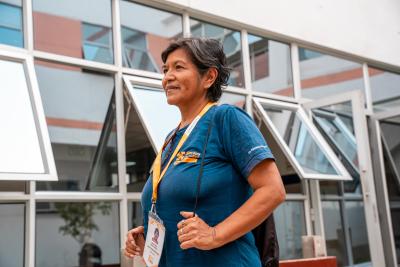
Siempre lista, la agente comunitaria María Rosas pone todo su esfuerzo y compromiso en el proyecto ALMA del programa de Enfermedades No Trasmisibles y Cáncer de SES.
An old saying goes that it is in the struggle that people discover their true vocation. María Rosas can attest to that: in 2000, while seeking to regularize her papers in Venezuela, she became the spokeswoman for many undocumented migrants. “I’ve always liked to help someone who needs something, it comes with me built-in,” she recounts.
Ten years later, when she had already returned to her home in the Lima district of Comas, this vocation returned. “Since I didn’t have a job, a friend told me if I didn’t want to work at the Maternal Center as a volunteer. I started as a health promoter and we began to look for children with anemia,” she recalls.
At 62 years old, our community agent has not lost that north. For the past four years she has been part of the ALMA project, of the SES Non-Communicable Diseases and Cancer program, and like many of her colleagues she travels inch by inch through her district to fight against breast cancer through different actions that favor early detection.
Maria often provides support to mothers who have been diagnosed with this disease. “We get involved with them, we follow up to see how they are doing, how the treatment is going when they have undergone surgery and support them with what they need most,” she says. They are the ones who, more often than not, test her strength.
“I have taken almost all the moms with cancer to INEN (National Institute of Neoplastic Diseases). The first time shocked me. I had to swallow my saliva, get strong, because I had never been to that hospital. Here you forget everything you did and you start thinking: I was born for this, to help,” she says.
María Rosas feels so involved with her work that, for her, every day is Women’s Day. Her eyes have witnessed intense struggles not only against death, but also against the social injustice that alienates patients from the benefits of modern medicine. “There are times when home is the street,” she says.
Today, hand in hand with her daughter, who also works as an SES community agent, she continues to do decisive work for the betterment of many women in vulnerable conditions. They, says Maria, always know how to thank her. It is her greatest satisfaction.
